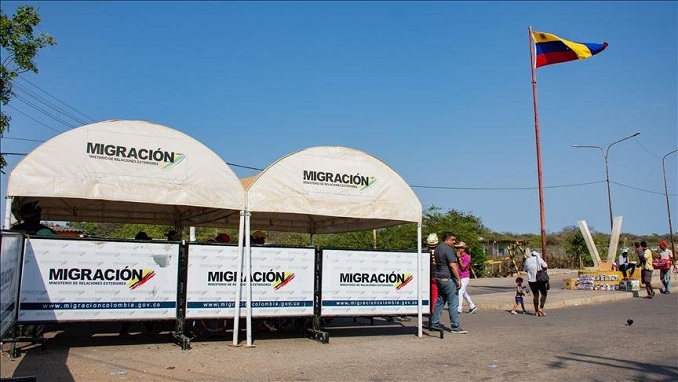Venezuela’s foreign minister announced Tuesday that his government is requesting help from the UN to address the heavy clashes that have been taking place at the country’s border with Colombia between the Venezuelan army and Colombian armed groups, Anadolu Agency reports.
During a press conference, Jorge Arreaza said the Venezuelan government is requesting technical assistance from the United Nations Service for Mine Action (UNMAS) and up-to-date advice to detect and deactivate the antipersonnel mines that Colombian irregular groups have planted on Venezuelan territory.
“Although our armed forces have the knowledge, with some trained in demining territories, technologies change and there are new contributions and new protocols, and we want this institution, which is dedicated to it, to be able to give our armed forces the advice to completely demine the territory,” Arreaza said.
He also asked the UN to open an investigation to determine where these irregular groups are hiding, arguing that the Colombian government of President Ivan Duque may be protecting these groups.
“Where did the irregular groups go, these terrorists who were in Apure [state]? Did they go to Barinas? No, they went to Arauca, a Colombian department, and there they are protected. Or do you have information in the media that some of these groups that the Venezuelan Armed Forces swept out from Apure have been terminated or prosecuted in Colombia? No, because they don’t,” he added.
For this reason, Arreaza also asked the UN to help Venezuela establish a direct channel of communication with the Colombian government so that the two administrations can work together in addressing the crisis on their border, so that “there is a minimum of coordination between the public forces,” he stressed.
Meanwhile, Venezuela’s Defense Minister Vladimir Padrino on Monday informed that troops of the Bolivian National Armed Forces (FANB) were deployed in three municipalities of the Apure state to fight Colombian irregular armed groups.
“By order of President Nicolas Maduro, we expanded the Special Integral Defense Operational Zone (ZODI) in the municipalities of Paez, Muñoz, and Romulo Gallegos,” Padrino explained and reported that eight Venezuelan soldiers have been killed in the ongoing conflict.
In those municipalities, authorities will strengthen migratory controls and restrict land, air, and river transit. The FANB could also apply special measures, such as inspecting homes and vacating public spaces.
“A greater military deployment will halt the warfare promoted by Colombian paramilitary groups with the complicity of President Ivan Duque and Washington,” Padrino explained.
Since March 21, the FANB has been fighting to eradicate criminal gangs which seek to settle in Venezuela to boost a civil war. In 15 days of military actions, 34 Venezuelan soldiers have been wounded and nine members of Colombian irregular groups have been killed. Currently, 33 people are being prosecuted by the justice system due to their alleged links with these criminal organizations.
Arreaza’s request came a day after the government of President Nicolas Maduro reported that eight Venezuelan soldiers had been killed during the border clashes.
Since the heavy clashes between the Venezuelan army and Colombian irregular groups began on March 21 this year, over 5,000 Venezuelans have left the border state of Apure out of fear and crossed into Colombia, a situation that has been described by the Colombian government as a “humanitarian crisis.”
Human Rights Watch (HRW) said in a January report that people in the western Venezuelan state of Apure and the neighboring Colombian province of Arauca face brutal violence from armed militants on a daily basis. In particular, it named the National Liberation Army, the Patriotic Forces of National Liberation, and a group that emerged from the demobilized Revolutionary Armed Forces of Colombia, commonly known as the FARC, among those who have abused citizens. HRW said cases of rights violations include murder, rape, forced child labor and others.
